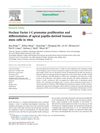
Search
for
Sort by
Research
930-960 / 1000+ results

research Current Perspectives on the Physiological Activities of Fermented Soybean-Derived Cheonggukjang
Cheonggukjang may help prevent and manage various diseases and improve overall health, but its odor and safety concerns need addressing.

research Harnessing the Power of Regenerative Therapy for Vitiligo and Alopecia Areata
Regenerative therapies show promise for treating vitiligo and alopecia areata.

research New Drugs Under Investigation for the Treatment of Alopecias
New treatments for hair loss show promise, but more research is needed to confirm their safety and effectiveness.

research Skin-Permeable Liposome Improved Stability and Permeability of bFGF Against Skin of Mice With Deep Second-Degree Scald to Promote Hair Follicle Neogenesis Through Inhibition of Scar Formation
A new liposome treatment helps heal deep burns on mice by improving hair regrowth and reducing scarring.

research Alopecia in Association with Malignancy: A Review
Hair loss in cancer patients can be related to the cancer itself, treatment, or other conditions, and understanding it is important for diagnosis and patient care.

research Breakdown of Immune Tolerance in AIRE-Deficient Rats Induces a Severe Autoimmune Polyendocrinopathy–Candidiasis–Ectodermal Dystrophy–Like Autoimmune Disease
AIRE-deficient rats developed severe autoimmune disease similar to APECED, useful for testing treatments.

research Accelerated Endothelial to Mesenchymal Transition Increased Fibrosis via Deleting Notch Signaling in Wound Vasculature
Disrupting Notch signaling in blood vessels increases scarring during wound healing in mice.

research Exploring Pericyte and Cardiac Stem Cell Secretome Unveils New Tactics for Drug Discovery
New drugs for heart disease may be developed from molecules secreted by stem cells.

research 3-Deoxysappanchalcone Promotes Proliferation of Human Hair Follicle Dermal Papilla Cells and Hair Growth in C57BL/6 Mice by Modulating WNT/β-Catenin and STAT Signaling
3-Deoxysappanchalcone helps human hair cells grow and stimulates hair growth in mice by affecting certain cell signaling pathways.

research Biochemistry of Epidermal Stem Cells
The review found that different stem cell types in the skin are crucial for repair and could help treat skin diseases and cancer.

research Expression and Function of Nuclear Receptor Co-Activator 4: Evidence of a Potential Role Independent of Co-Activator Activity
NcoA4 may have roles beyond helping control gene activity, possibly affecting cell behavior and stability.

research Hormonal Trends in Patients Suffering from Long COVID Symptoms
Long COVID patients may have hormonal imbalances linked to their symptoms.

research Regenerative Medicine Meets Mathematical Modelling: Developing Symbiotic Relationships
Mathematical modeling can improve regenerative medicine by predicting biological processes and optimizing therapy development.

research A Review of Hedgehog Inhibitors Sonidegib and Vismodegib for Treatment of Advanced Basal Cell Carcinoma
Sonidegib and vismodegib are similarly effective for advanced basal cell carcinoma, but sonidegib might have a slightly better safety profile.

research Possible Therapeutic Effects of Ozone Mixture on Hypoxia in Tumor Development
Ozone therapy might improve cancer treatment and reduce its side effects.

research Dapsone Therapy for Pustular Psoriasis: Case Series and Review of the Literature
Dapsone improved pustular psoriasis in patients who didn't respond to other treatments and is considered a well-tolerated option.

research Stem Cells and Aberrant Signaling of Molecular Systems in Skin Aging
Skin aging is caused by stem cell damage and can potentially be delayed with treatments like antioxidants and stem cell therapy.

research Radioprotection of Lung Tissue by Soy Isoflavones
Soy isoflavones can protect lung tissue from radiation damage.

research Hair Repigmentation Associated with the Use of Lenalidomide: Graying May Not Be an Irreversible Process
An 81-year-old man's white hair began to regain its original color while he was treated with lenalidomide, suggesting that graying hair might be reversible.

research Safe Selection of Genetically Manipulated Human Primary Keratinocytes with Very High Growth Potential Using CD24
Researchers found a safe and effective way to pick genetically modified skin cells with high growth potential using CD24.

research Toxic Epidermal Necrolysis
Toxic Epidermal Necrolysis is a rare, serious skin condition that can affect anyone, is more common in women, and may be linked to genetics, with a 20% mortality rate mainly due to sepsis.

research Genetic Fate-Mapping Reveals Surface Accumulation But Not Deep Organ Invasion of Pleural and Peritoneal Cavity Macrophages Following Injury
Cavity macrophages gather on organ surfaces but don't really invade or help repair the organs after injury.

research Interventions for Morphea
Some treatments like methotrexate with prednisone might help juvenile morphea, but more research is needed to confirm.

research The Topography of Fibrous Scaffolds Modulates the Paracrine Function of Adipose-Derived Mesenchymal Stem Cells in the Regeneration of Skin Tissues
The shape of fibrous scaffolds can improve how stem cells help heal skin.

research An Updated Review on Hibiscus Rosa-Sinensis Phytochemistry and Medicinal Uses
Hibiscus rosa-sinensis may help treat various health issues and promote hair growth, but more research is needed for safety.

research Thyroid Diseases and Skin Autoimmunity
Thyroid diseases may contribute to autoimmune skin diseases, and more research is needed on their relationship.

research Friends Turned Foes: Angiogenic Growth Factors Beyond Angiogenesis
Some growth factors, while important for normal body functions, can cause diseases when not regulated properly.

research Skin-Derived Stem Cells as a Source of Primordial Germ Cell and Oocyte-Like Cells
Skin-derived stem cells can become various cell types, including germ cell-like and oocyte-like cells.

research Nuclear Factor I-C Promotes Proliferation and Differentiation of Apical Papilla-Derived Human Stem Cells In Vitro
NFIC helps human dental stem cells grow and become tooth-like cells.